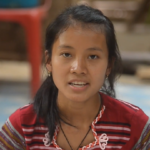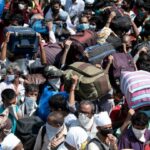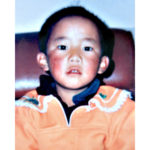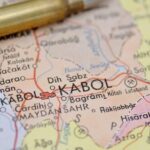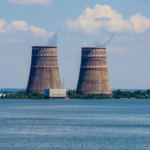Displaced People Numbers Escalate Globally: An Interview With IMA’s Professor Bruno Di Biase
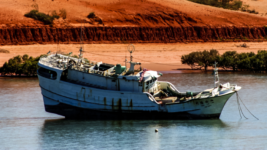
In its June-released Global Trends Forced Displacement Report in 2021, the United Nations High Commissioner for Refugees (UNHCR) revealed that there were 89.3 million displaced persons globally at the end of last year.
These figures are part of an escalating trend over the last decade, which has seen the number of displaced double since the end of 2012, along with a sharp increase of 8 percent over the previous 12 months, which translates to almost an additional seven million forced to flee their homes.
However, on releasing its annual trend report, the UNHCR outlined that due to the onset of war in Ukraine, along with the impact of other crises in Afghanistan and in Africa, including the conflict in Ethiopia, the number of people displaced around the world surpassed 100 million in May.
And with the rising climate crisis, which is further exacerbating food scarcity and conflicts, the number of displaced people is only set to increase, whilst the solution of many nations of the Global North is to reinforce their systems to keep people fleeing out.
Displaced down under
Australia is a prime example of a nation that has taken the route of fortifying its borders in order to curb the flow of the Earth’s displaced, despite the fact that our nation ratified the 1951 Refugee Convention in 1954.
The nation’s harsh immigration regime is held up as exemplary by reactionary politicians around the world. And although those in offshore immigration, which has seen about 4,000 people pass through it, has dwindled to under 300, there continues to be thousands stuck in legal limbo.
As many have pointed out, during the pandemic years, Australia was suffering a shortage of workers, yet, at that same time, it had thousands of people locked in immigration detention, who were ready to work but unable to.
Indeed, thousands of demonstrators, including a majority of refugees, converged on Parliament House last week, calling for the Albanese government to make good on its election promise and cancel the temporary visas of over 31,000 and provide them with permanent protection.
The status of displaced people
Established last December, the International Migrant Alliance (IMA) Australia chapter recently held its first webinar, in which representatives from various organisations came together to discuss the status of displaced people in this country.
The IMA is an organisation, initially formed in an effort to improve the lot of migrant domestic workers in Hong Kong, which has now spread out across the globe with the aim of upholding the rights of migrants and refugees within their countries of migration.
Sydney Criminal Lawyers spoke to IMA Australia chair Bruno Di Biase about how the situation for displaced peoples is developing globally, the plight of Afghan people who assisted Australian troops during the war and how the coming of Labor still holds the hope of change.
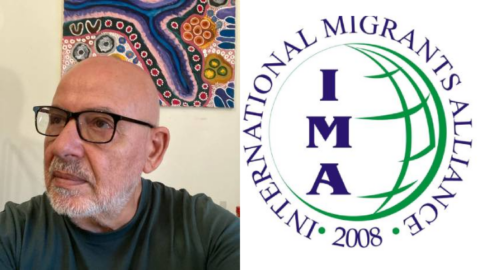
The number of displaced people around the world has been growing at a heightened rate recently, due to the dual crises of the pandemic and changing climate.
The International Migrant Alliance (IMA) Australia recently held a 24 August webinar titled, The Status of Displaced People in Australia.
Can you talk on how this situation is evolving at present?
IMA stands for a world without forced migration. But all the facts and figures in this regard point to impending disaster.
Already last May, the UN High Commissioner for Refugees, Filippo Grandi, commenting on the terrible record of over 100 million forcibly displaced people showing from their latest report, warned that this is “a stark figure – sobering and alarming in equal measure.”
“It’s a record that should never have been set,” he added. “This must serve as a wake-up call to resolve and prevent destructive conflicts, end persecution, and address the underlying causes that force innocent people to flee their homes”.
As we know, the conflict arising from the invasion of Ukraine is continuing with no sign of negotiation in sight.
If anything, this conflict seems to be driving towards a deadlock that continues to cause enormous destruction, not only of infrastructure, but also hundreds of thousands of people’s homes and it’s causing enormous displacement of people both inside the country’s borders and seeking refuge abroad.
At our 24th August forum, Professor Fethi Mansouri said that figures from Ukraine have already reached nearly seven million people: a figure that by now may well be over that. And this comes at the tail end of the long conflict in Syria, which displaced over six million people.
Regional conflicts from Myanmar to Sri Lanka – and within India too, with undercurrents of Hindu-Muslim conflict, with long-term and current attempts by the Modi government to change legislation – may cause further waves of refugees.
And we can start even now to see people forced to leave their area or even their countries, especially in the world’s south, on account of climate change caused in the greatest part not by them but by the richer countries, as we can witness now in Pakistan.
The IMA forum had a focus on displaced people in Australia. So, broadly speaking, how did those attending consider the issue in this country?
Australia’s recent record is just appalling, and it has suffered further drastic reductions in the face of the COVID-19 pandemic, coupled with the conservative government.
Just before the elections, the government was gloating on Australia’s record unemployment figures, while on the other hand, employers big and small could not find who to employ.
Australia’s traditional humanitarian intake has run down to a trickle. The 2021 figures for asylum seekers and refugees are quite telling.
Out of nearly 14,000 applications, 2,850 were accepted and more than 14,000 were rejected – some from the previous year’s applications – with a miserly acceptance rate of 16.2 percent from figures supplied by Professor Mansouri.
Massoud Foundation Australia social worker Bilal Waheed spoke on the plight of the Afghan people who’d been employed by this nation’s government to assist its troops prior to the pull out of the allies and the Taliban retaking control of the Central Asian nation.
Can you outline what Waheed said?
He encouraged Australia to expedite the intake from Afghanistan. Out of the 35,000 places the Morrison government promised for Afghans who helped Australia during the 20 year conflict, only around 5,000 have been evacuated since August 2021, and they’re on temporary humanitarian stay visas.
At the same time, the backlog of applications from Afghanistan needs to be processed as quickly as possible, because people there are risking their lives every day.
The Taliban do not see favourably those who collaborated with western occupying forces and so every day that goes by, the risk is that more and more people may be killed.
The Massoud Foundation is facing a great task in providing assistance to those who arrive while staying connected with those attempting to get out of the country.
It is also providing educational assistance online particularly for girls who, as we know, are practically excluded from education by the Taliban.
As an off-shoot from that encounter between communities, I can tell you that a soccer match has been organised between an Afghan community team and an Italian community team sponsored by FILEF (the Federation of Italian Migrant Workers and Families), which is an IMA member organisation.
Since we last spoke in December, there’s been a change in government. How do you consider the coming of the Albanese government will affect displaced persons?
We see this change as a great opportunity for Australia to re-start its relationship with migrants and refugees on a good path.
This century has only seen more restrictions and more obstacles to people’s movement. This has been on the assumption that Australians are against giving refuge to asylum seekers, and that they’re fearful of some kind of invasion.
As a migrant myself from 1970, I have not found that to be the case. There has been a great evolution in Australia in terms of the acceptance, and even the cherishing of diversity.
The Biloela community is a fantastic recent example of solidarity from the Australian people against the wishes of their own government.
Of course, there are also considerable conservative forces too. But the majority of the Australian people rejected their retrograde ideas and opportunistic acts, including some purportedly corrupt practices of the previous government.
The new government can and must do better than the previous one.
As the new home affairs minister Clare O’Neil said at the job summit, “This is a turning point in our history as momentous as the post-war ‘populate or perish’ program that was the foundation of our post-war reconstruction, nation building and national security.”
But I would have liked to see some sign of a change in attitude towards asylum seekers and refugees, and the thousands of people currently on temporary visas, in terms of being offered something better.
Especially now that Australia is so clearly in need of an expanded workforce as demonstrated by the job summit itself.
It didn’t happen. But it’s still early days and there’s room for hope that attitudes and legislation will change, for the better of course.
IMA Global chair Eni Lestari invited webinar participants to join the organisation’s 5th Global National Congress in Bangkok at the end of November.
And participants at the IMA Australia webinar were ultimately drawn to the questions: Where do we go to from here? What needs to be done?
What were some of the responses to these questions from the IMA Australia meeting?
We will do what we can to have representatives from Australia attend the IMA 5th Global Conference, which will also be our first conference as the Australian chapter of the International Migrant Alliance.
IMA could do well in including stronger voices from refugees and asylum seekers, though we are aware of the difficulties and obstacles they would encounter to participate in terms of letting their voices be heard.
We would like to have people, such as our young activist speaker from the Tamil Refugee Council of Australia, Renuga Inpakumar, represent such voices, and we will certainly sponsor such participants.
As part of the initiatives we need to follow as IMA, we need to promote greater contact and cooperation between the older migrant communities and the newer refugees and asylum seekers communities.
The need to promote community campaigns for refugee rights of protection and residency in Australia was also strongly highlighted.
And lastly, Bruno, as IMA Australia chair, would sorts of solutions to the displaced persons issue in this country do you consider are needed?
The displaced persons situation worldwide is nothing short of disastrous and requires every responsible and civilised democratic country in the world to act as one should act for emergencies in one’s own country.
This is with aid, resources, volunteers and getting over the bureaucratic complexities engulfing the displaced people’s movement.
There has to be some kind of “war effort” to process refugees and asylum seekers commensurate to the problem and to the resources the country can deploy both from the government and communities.
Sure enough, it is a good move from the job summit to employ more people for processing the enormous backlog of visa applications.
But at the same time, the intake communities must also be helped to ensure that new arrivals have a fair chance to reconstruct their lives.
In that respect, an important step is to repeal the recent legislation on restricting refugee visas to an arbitrary and misguided “temporary protection”.
If Australia accepts refugees, it must also give them a chance, at least like it allowed other migrants since post-WWII, to find jobs, to have access to education and training, health and social services and to provide real reasons for refugees and asylum seekers to trust Australia’s fairness as their hope for the future.


